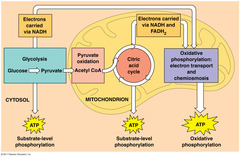| 5486457512 | Cellular Respiration | The process by which cells break down organic molecules and use an electron transport chain to produce energy (ATP) C6H12O6 + 6O2 --> 6 CO2 + 6H2O + energy (oxidative process) |  | 0 |
| 5486457513 | ATP | Consists of adenosine plus 3 phosphates; source of immediate energy for all cells (recognize this structure) |  | 1 |
| 5486457514 | Glycolysis | The first stage in cellular respiration or fermentation that splits glucose into 2 molecules of pyruvate - Occurs in cytoplasm (cytosol) - Is anaerobic (does not require oxygen) | 2 | |
| 5486457515 | Fermentation | Partial degradation (break down) of sugars in the absence of oxygen -Does not release much energy -End products are alcohol or lactic acid | 3 | |
| 5486457516 | Aerobic Respiration | Break down of organic fuel in the presence of oxygen - Consists of Krebs cycle and electron transport chain (ETC) and oxidative phosphorylation - Occurs in the mitochondria |  | 4 |
| 5486457517 | Citric Acid Cycle | Synonym for Krebs Cycle | 5 | |
| 5486457518 | Anaerobic Respiration | Synonym for fermentation | 6 | |
| 5486457519 | Aerobic | With oxygen | 7 | |
| 5486457520 | Anaerobic | Without oxygen |  | 8 |
| 5486457521 | Krebs Cycle | The second step in cellular respiration which involves many chemical steps to convert acetyl CoA to carbon dioxide - Occurs in the mitochondrial inner matrix - Turns twice for each molecule of glucose - also known as Citric Acid Cycle | 9 | |
| 5486457522 | Acetyl CoA | Acetyl coenzyme A which combines with pyruvate from the first step in respiration; raw material of Krebs cycle | 10 | |
| 5486457523 | ATP synthase | An enzyme that produces ATP as protons (H+) flow down a gradient through chemiosmosis or oxidative phosphorylation |  | 11 |
| 5486457524 | Electron Transport Chain (ETC) | Electrons flow down a sequence of electron carrier molecules (chain) in a series of redox reactions that release the energy used to make ATP |  | 12 |
| 5486457527 | Chemiosmosis | An energy coupled process that uses the energy released as protons flow down a proton gradient to synthesize ATP - In the presence of oxygen (aerobic), most ATP synthesis in cells occurs by chemiosmosis |  | 13 |
| 5486457528 | Substrate-Level Phosphorylation | Process by which an enzyme transfers a phosphate from a susbtrate directly to ADP, forming ATP |  | 14 |
| 5486457529 | Oxidative Phosphorylation | The third major stage in cellular respiration; the production of ATP using energy from the electron transport chain (ETC) |  | 15 |
| 5486457532 | NAD+/NADH | One of the most important coenzymes in the cell that acts as an electron carrier - NAD+ traps electrons from glucose and is reduced (gains electrons) to become NADH - When NADH transfers its electrons to the ETC, it is oxidized (loses electrons) to become NAD+ | 16 | |
| 5486457533 | FAD/FADH2 | Secondary electron transporter to the ETC from the Krebs cycle, entering at lower energy levels than NADH | 17 | |
| 5486457534 | Redox Reactions | Reduction and oxidation reactions due to the transfer of one or more electons |  | 18 |
| 5486457535 | Reduction | Gain of electrons; gain of hydrogen -> for storing energy |  | 19 |
| 5486457536 | Oxidation | Loss of electrons; loss of hydrogen -> for releasing energy |  | 20 |
| 5489328523 | Proton-Motive Force | The potential energy stored in the form of a proton electrochemical gradient, generated by pumping hydrogen ions (H+) across a biological membrane during chemiosmosis | 21 | |
| 5489962976 | Pyruvate | The 3-carbon sugar that is the product of splitting glucose in glycolysis (the first stage of cellular respiration) - sometimes called pyruvic acid | 22 |
Cell Respiration - AP Biology Flashcards
Primary tabs
Need Help?
We hope your visit has been a productive one. If you're having any problems, or would like to give some feedback, we'd love to hear from you.
For general help, questions, and suggestions, try our dedicated support forums.
If you need to contact the Course-Notes.Org web experience team, please use our contact form.
Need Notes?
While we strive to provide the most comprehensive notes for as many high school textbooks as possible, there are certainly going to be some that we miss. Drop us a note and let us know which textbooks you need. Be sure to include which edition of the textbook you are using! If we see enough demand, we'll do whatever we can to get those notes up on the site for you!

